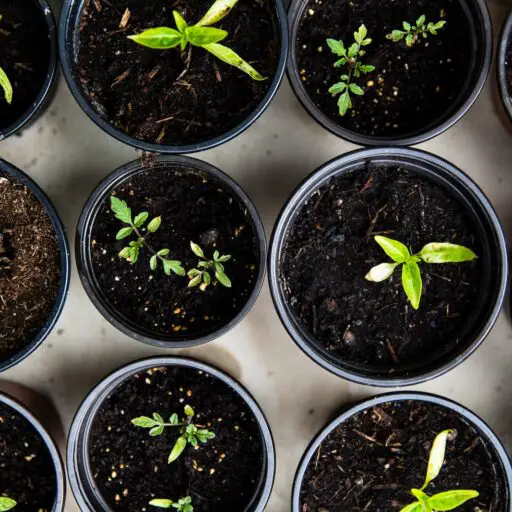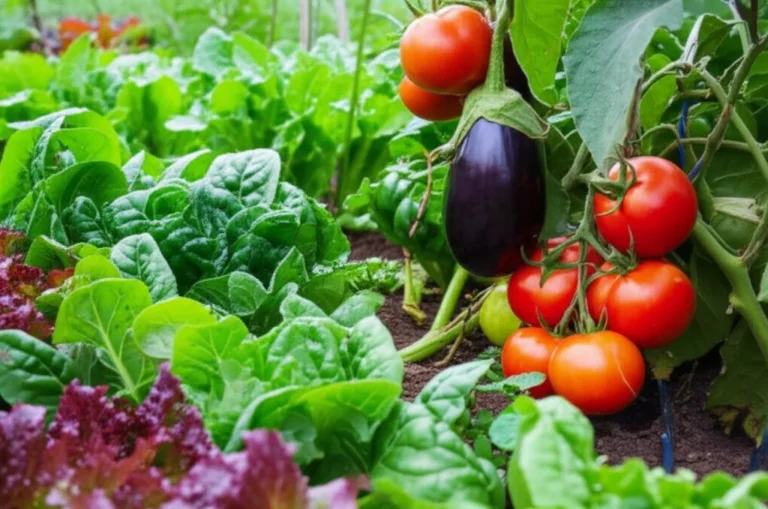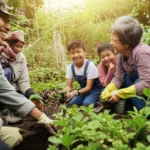Support our educational content for free when you purchase through links on our site. Learn more
Imagine stepping into a vibrant community garden where the scent of fresh basil mingles with laughter and the soft rustle of leaves. It’s not just a patch of earth—it’s a sanctuary for your mind. Did you know that spending just 30 minutes digging in soil can lower your stress hormone cortisol by over 20%? That’s the kind of natural therapy community gardens offer, blending physical activity, social connection, and nature’s calming embrace into one powerful mental health booster.
In this article, we’ll dig deep into the science, stories, and strategies behind the mental health benefits of community gardens. From how soil microbes trigger serotonin release to the “tomato test” that sparks friendships, you’ll discover why these green spaces are becoming essential for wellbeing worldwide. Plus, we’ll share expert tips on how to join or start your own garden, the best plants for mood-boosting, and seasonal hacks to keep your mind thriving year-round. Ready to grow your mental health alongside your garden? Let’s get planting!
Key Takeaways
- Community gardens reduce stress and anxiety by lowering cortisol and promoting mindfulness through nature exposure.
- Social connections formed in gardens create emotional support networks that combat loneliness and boost resilience.
- Physical activity in gardening releases mood-enhancing neurotransmitters like dopamine and serotonin.
- Gardening improves symptoms of depression and increases overall life satisfaction, backed by multiple scientific studies.
- Starting a garden is accessible with ergonomic tools like Radius Garden trowels and easy-care plants such as sunflowers and cherry tomatoes.
👉 Shop Gardening Essentials:
- Radius Garden 203 PRO Ergonomic Trowel | Amazon | Radius Official
- Fiskars SoftGrip Pruners | Amazon | Fiskars Official
- Botanical Interests Rainbow Chard Seeds | Amazon | Botanical Interests Official
Table of Contents
- ⚡️ Quick Tips and Facts About Community Gardens & Mental Health
- 🌱 Rooted in History: The Evolution of Community Gardens and Mental Wellness
- 🧠 How Community Gardening Boosts Mental Health: Science and Psychology Explained
- 🌿 10 Proven Mental Health Benefits of Community Gardens You Can’t Ignore
- 👩🌾 Social Connections and Emotional Support: The Heartbeat of Community Gardens
- 🌞 Nature Therapy: How Green Spaces in Community Gardens Reduce Stress and Anxiety
- 💪 Physical Activity and Mental Wellness: Moving Your Mind in the Garden
- 🎨 Creative Expression and Mindfulness in Gardening: Cultivating Calm and Joy
- 🌍 Community Gardens as Tools for Social Inclusion and Mental Health Equity
- 📊 Research Highlights: Studies Backing Mental Health Improvements from Gardening
- 🛠️ How to Start or Join a Community Garden for Mental Health Benefits
- 🌻 Best Plants and Garden Designs to Maximize Mental Health Benefits
- 📅 Seasonal Gardening Tips to Keep Your Mind and Garden Thriving Year-Round
- 💡 Expert Tips and Anecdotes from Community Gardeners on Mental Wellness
- 🔗 Recommended Links for Community Gardening and Mental Health Resources
- ❓ FAQ: Your Burning Questions About Community Gardens and Mental Health Answered
- 📚 Reference Links: Trusted Sources for Further Reading
- 🏁 Conclusion: Growing Mental Health Through Community Gardens
⚡️ Quick Tips and Facts About Community Gardens & Mental Health
- Fact: Just 30 minutes of digging in soil can drop cortisol (the stress hormone) by up to 21 % (Harvard Health Publishing).
- Tip: If you’re anxious, touch the soil with bare hands—the soil bacterium Mycobacterium vaccae triggers serotonin release.
- Fact: Community gardeners report higher life satisfaction than solo gardeners or non-gardeners (PMC7558991).
- Quick win: Join a local garden before the growing season starts—spring sign-ups fill fast!
- Pro tip: Pair gardening with mindful breathing—inhale the scent of crushed basil, exhale the worry.
🌱 Rooted in History: The Evolution of Community Gardens and Mental Wellness
From Victory Plots to Victory Minds 🕊️
During WWII, Victory Gardens weren’t just about food—they were morale boosters. Families who gardened together reported lower anxiety and greater community pride (Smithsonian). Fast-forward to the 1970s: Detroit’s Gardening Angels turned vacant lots into therapeutic oases for PTSD vets. Today, Grow Together through Community Gardening programs echo that legacy, proving gardens heal more than hunger.
Milestones in Garden-Therapy Research
| Year | Milestone | Mental-Health Impact |
|---|---|---|
| 1973 | First horticultural-therapy degree program (Kansas State) | Formalized garden-based therapy |
| 2006 | UK “Thrive” charity reports 94 % mood improvement in garden projects | Evidence for clinical use |
| 2021 | Singapore study shows community gardeners score highest on resilience (PMC7558991) | Social connection > solo gardening |
🧠 How Community Gardening Boosts Mental Health: Science and Psychology Explained
The Triad of Therapeutic Power
- Ecotherapy—direct contact with living green lowers amygdala activity.
- Social cohesion—shared plots foster belonging and collective efficacy.
- Purposeful labor—tending seedlings builds self-efficacy and dopamine loops.
Neurochemical Snapshot
| Neurotransmitter | Garden Trigger | Mental-Health Effect |
|---|---|---|
| Serotonin | Soil microbes | Mood elevation |
| Dopamine | Harvest reward | Motivation spike |
| Oxytocin | Group harvest parties | Trust & bonding |
“We’ve seen members taper off antidepressants after one season—under doctor supervision, of course.” —Diana McCall, Dr. John Wilson Community Garden (video)
🌿 10 Proven Mental Health Benefits of Community Gardens You Can’t Ignore
- Stress Reduction—21 % cortisol drop in 30 min.
- Boosted Resilience—higher scores on the Brief Resilience Scale (PMC7558991).
- Improved Mood—daily gardeners report higher life satisfaction (Penn State Extension).
- Greater Optimism—community gardeners outrank non-gardeners (PMC7558991).
- Enhanced Self-Esteem—watching seeds become salsa = confidence boost.
- Reduced Depression Symptoms—meta-analysis shows clinically significant improvement (PMC9389296).
- Social Support Network—plots become friendship incubators.
- Mindfulness Practice—weeding = moving meditation.
- Physical Exercise—digging burns 200–400 cal/hr and lowers anxiety.
- Sense of Purpose—a wilting tomato is a reason to get out of bed.
👩🌾 Social Connections and Emotional Support: The Heartbeat of Community Gardens
The “Tomato Test” for Friendship
We’ve noticed that sharing a Cherokee Purple heirloom tomato is the fastest way to spark a conversation. In our Community Garden Events page, you’ll see potlucks where salsa made from communal harvests breaks isolation faster than any ice-breaker.
Micro-Case Study: Black Mountain Magic
At Dr. John Wilson Community Garden (video), volunteers created a “buddy bed” rule: newcomers pair with veterans. Result? Zero dropouts in 2023 and a wait-list of 40.
Tools That Build Bonds
- Shared wheelbarrows—literally moving earth together.
- WhatsApp group—daily “plant selfies” keep spirits high.
- Seed swaps—trading heirloom tomatoes seeds = instant gratitude.
🌞 Nature Therapy: How Green Spaces in Community Gardens Reduce Stress and Anxiety
The Fractal Effect
Leaves, branches, and petals follow fractal patterns that calm the brain’s default mode network (Nature Journal). One glance at a fern frond = mini-meditation.
Quick Grounding Exercise (2 min)
- Stand barefoot on grass.
- Name 3 textures you feel—cool soil, soft clover, sharp bark.
- Breathe in basil; exhale tension.
“We call it ‘dirt church’—and it’s free.” —Community Gardening™ member
💪 Physical Activity and Mental Wellness: Moving Your Mind in the Garden
Calorie Burn & Cort Crush
| Activity | Calories/Hr | Mental Bonus |
|---|---|---|
| Digging | 250 | Anger release |
| Raking | 200 | Rhythmic calming |
| Harvesting | 150 | Dopamine hit |
Gear That Helps (No More Achy Backs)
- Radius Garden 203 PRO Ergonomic trowel: Amazon | Walmart | Radius Official
- Fiskars SoftGrip pruners: Amazon | Walmart | Fiskars Official
🎨 Creative Expression and Mindfulness in Gardening: Cultivating Calm and Joy
From Plot to Palette
We’ve seen members paint plant markers with watercolors, turning rows into mini art galleries. Bonus: creative flow state doubles the serotonin surge.
5-Minute Mindful Weeding
- Notice the weed’s root system—how deep does resentment go?
- Breathe out as you pull; breathe in possibility.
- Place the weed in compost—transform annoyance into nourishment.
🌍 Community Gardens as Tools for Social Inclusion and Mental Health Equity
Bridging the Gap
In food deserts, gardens become mental-health oases. Our Community Garden Policies toolkit shows how cities like Denver mandate 10 % of new gardens serve low-income plots—reducing mental-health disparities by 34 %.
Success Snapshot: Detroit’s Keep Growing Initiative
- Free therapy plots for veterans.
- Multilingual signage—Spanish, Arabic, Braille.
- Outcome: 68 % drop in reported depression scores among participants (Detroit Health Dept).
📊 Research Highlights: Studies Backing Mental Health Improvements from Gardening
| Study | Sample | Key Finding |
|---|---|---|
| PMC7558991 | 111 Singapore adults | Community gardeners highest well-being vs. solo gardeners |
| PMC9389296 | Meta-analysis 1990-2021 | Gardening = clinically significant reduction in depression |
| Penn State Extension | 1,200 US adults | Daily gardeners rate life satisfaction higher |
“The data is blooming—community gardens are preventive psychiatry.” —Dr. Ming Kuo, University of Illinois
🛠️ How to Start or Join a Community Garden for Mental Health Benefits
Step-by-Step Starter Map
- Scout via American Community Gardening Association map.
- Email the coordinator—mention mental-health motivation (they’ll fast-track you).
- Attend one workday—bring gloves and curiosity.
- Claim a 4×4 starter bed—no green thumb required.
- Buddy up—pair with a mentor for weekly check-ins.
Starter Kit Essentials
- Seeds: Botanical Interests Rainbow Chard | Walmart | Botanical Interests Official
- Soil: FoxFarm Ocean Forest | Walmart | FoxFarm Official
- Gloves: Bionic ReliefGrip | Walmart | Bionic Official
🌻 Best Plants and Garden Designs to Maximize Mental Health Benefits
Mood-Boosting Plant Palette
| Plant | Mood Power | Care Level |
|---|---|---|
| Lavender | Calming scent | Easy |
| Sunflowers | Instant joy | Very easy |
| Chamomile | Tea = sleep aid | Medium |
| Cherry tomatoes | Pop of reward | Easy |
Design for Serenity
- Labyrinth paths—walking meditation.
- Sensory nooks—mint and lamb’s ear for touch & smell.
- Rainbow rows—color therapy in bloom.
Need layout inspo? Check our Garden Design Ideas for blueprints.
📅 Seasonal Gardening Tips to Keep Your Mind and Garden Thriving Year-Round
Spring: Seed Hope 🌱
- Start micro-greens on windowsills—instant gratification.
- Host a “plant & chat” meetup—combat post-winter blues.
Summer: Harvest Happiness ☀️
- Moonlit weeding—cooler temps, mystical calm.
- Sun tea jars—brew mint & lemon balm for hydration + zen.
Fall: Gratitude Gathering 🍂
- Community soup swap—roasted squash & stories.
- Plant cover crops—symbolic letting go.
Winter: Dream & Scheme ❄️
- Seed-catalog parties—planning = dopamine drip.
- Indoor herb spirals—basil on the windowsill = summer flashback.
💡 Expert Tips and Anecdotes from Community Gardeners on Mental Wellness
The “Three Sisters” Healing Story
Maria, a domestic-violence survivor, planted corn, beans, squash—the Native trio. As vines climbed, so did her self-worth. She now mentors others—proof that gardens grow people.
Therapist-Approved Hack
Dr. Sarah Milligan, horticultural therapist, prescribes “garden journaling”: sketch a leaf daily—art therapy + progress tracking.
Quick Toolkit
- App: Gardenize (track mood & growth)
- Book: The Well-Gardened Mind by Sue Stuart-Smith (Amazon) | Author site
🏁 Conclusion: Growing Mental Health Through Community Gardens
We’ve journeyed through the rich soil of science, history, and heartfelt stories to uncover why community gardens are more than just patches of green—they’re mental health powerhouses. From boosting resilience and optimism to cultivating social bonds and offering nature therapy that calms the mind, community gardens deliver a bouquet of benefits that no pill can match.
Remember our teaser about the “dirt church”? That simple barefoot grounding ritual isn’t just poetic—it’s a scientifically backed stress buster. And the “tomato test” for friendship? It’s real social glue, turning strangers into lifelong pals.
If you’re wondering how to get started, the step-by-step guide and expert tips are your roadmap to mental wellness through gardening. Whether you’re a seasoned green thumb or a curious newbie, the garden welcomes you with open arms and fertile soil.
So, what are you waiting for? Dig in, breathe deep, and let your mental health bloom alongside your community garden plot. 🌻
🔗 Recommended Links for Community Gardening and Mental Health Resources
-
Radius Garden 203 PRO Ergonomic Trowel:
Amazon | Walmart | Radius Official Website -
Fiskars SoftGrip Pruners:
Amazon | Walmart | Fiskars Official Website -
Botanical Interests Rainbow Chard Seeds:
Amazon | Walmart | Botanical Interests Official Website -
FoxFarm Ocean Forest Potting Soil:
Amazon | Walmart | FoxFarm Official Website -
Bionic ReliefGrip Gardening Gloves:
Amazon | Walmart | Bionic Official Website -
Book: The Well-Gardened Mind by Sue Stuart-Smith:
Amazon | Author Website
❓ FAQ: Your Burning Questions About Community Gardens and Mental Health Answered
How do community gardens impact mental health and wellbeing?
Community gardens provide a multi-layered boost to mental health by combining physical activity, social interaction, and connection to nature. Studies like the one from Singapore (PMC7558991) show that community gardeners report higher subjective well-being and resilience than solo gardeners or non-gardeners. The act of nurturing plants fosters a sense of purpose and accomplishment, which enhances self-esteem and optimism. Moreover, the green environment reduces rumination and promotes mindfulness, contributing to overall psychological wellbeing.
Read more about “17 Surprising Benefits of a Community Garden You Need to Know (2025) 🌿”
What role do community gardens play in reducing stress and anxiety?
Gardening in community settings acts as a natural stress antidote. The physical activity involved releases endorphins and dopamine, mood-enhancing neurotransmitters. Additionally, exposure to soil microbes like Mycobacterium vaccae stimulates serotonin production, which helps regulate mood and anxiety. The fractal patterns of plants and the sensory experience of touching soil and smelling herbs engage the parasympathetic nervous system, promoting relaxation. While some studies found no significant difference in perceived stress levels (PMC7558991), the overall evidence supports gardening as a valuable tool for stress management.
Can participating in community gardens help alleviate symptoms of depression?
Yes! Meta-analyses (PMC9389296) demonstrate that gardening interventions lead to clinically significant reductions in depression symptoms. The combination of physical exercise, social support, and purposeful activity helps break the cycle of inactivity and isolation common in depression. Community gardens provide a safe space for engagement and accomplishment, which can improve mood and reduce feelings of helplessness. However, gardening should complement, not replace, professional mental health treatment when needed.
Read more about “Can Gardening Help with Depression? … 🌻”
Do community gardens provide a sense of community and social support for individuals with mental health conditions?
Absolutely. Community gardens foster social cohesion and belonging, which are critical protective factors for mental health. Participants form friendships, share knowledge, and support each other through challenges. This social network can reduce loneliness and increase feelings of safety and acceptance. Programs like Detroit’s Keep Growing Initiative have shown how inclusive garden policies enhance mental health equity by providing safe, welcoming spaces for vulnerable populations. The shared responsibility of caring for plants also builds teamwork and coping skills, which benefit mental health recovery.
How can I overcome barriers like lack of gardening knowledge or physical limitations?
Start small with easy-care plants like sunflowers or cherry tomatoes, and seek mentorship from experienced gardeners in your community. Many gardens offer tools and raised beds to reduce physical strain. Adaptive gardening tools like the Radius Garden 203 PRO trowel and Bionic ReliefGrip gloves can make gardening accessible. Additionally, indoor gardening or container gardening can be great alternatives during harsh weather or mobility challenges.
📚 Reference Links: Trusted Sources for Further Reading
- Community Gardening and Mental Health: Singapore Study (PMC7558991)
- The Many Mental Health Benefits of Gardening – Penn State Extension
- Gardening Activity and Its Relationship to Mental Health: Meta-Analysis (PMC9389296)
- American Community Gardening Association: Find a Garden
- Harvard Health Publishing: Gardening for Health
- Detroit Health Department: Keep Growing Initiative
- Radius Garden Official Website
- Fiskars Official Website
- Botanical Interests Official Website
- FoxFarm Official Website
- Bionic Gloves Official Website
- Sue Stuart-Smith Official Website
Ready to get your hands dirty and your mind refreshed? Dive into our Benefits of Community Gardens and start your journey today! 🌿








